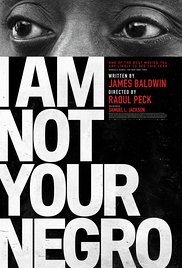In Doc Corner, Glenn Dunks looks at current, future and past documentaries of note...
 With new year resolutions no doubt already a distant memory (it's been three days!), it’s probably time to remember that it is really hard for people to change. And I don't just mean quitting smoking. We can try all we want, but even those of us who consider ourselves ‘progressive’ probably can’t say with any real confidence that we're not set in our ways; the same person deep inside that we were a decade ago. And even if that isn’t the case, as hard as it is to change just ourselves, just think how much harder it is to change the larger mass. And with a new President about to be inaugurated on the back of violent, blatant racism, it is sadly even more pertinent to remember this.
With new year resolutions no doubt already a distant memory (it's been three days!), it’s probably time to remember that it is really hard for people to change. And I don't just mean quitting smoking. We can try all we want, but even those of us who consider ourselves ‘progressive’ probably can’t say with any real confidence that we're not set in our ways; the same person deep inside that we were a decade ago. And even if that isn’t the case, as hard as it is to change just ourselves, just think how much harder it is to change the larger mass. And with a new President about to be inaugurated on the back of violent, blatant racism, it is sadly even more pertinent to remember this.
Now, these are not necessarily ideas that are at the forefront of Raoul Peck’s superb I Am Not Your Negro, but as it was with 13th, 10 Bullets, 3 ½ Minutes, O.J.: Made in America and many other documentaries about race, it is a recurring theme that bubbles to the surface as if by default. The more we think things are changing, the more they sadly stay the same. A film about race in the 1950s and 1960s is, sadly and inevitably, a film about race in the modern age for we are doomed to repeat the sins of the past no matter what we do...

“The story of the negro in America is the story of America”, says James Baldwin, the subject of Peck’s film. “It is not a pretty story.”
I Am Not Your Negro is not just a film about the history of race in America, although it has its roots in that concept. It is a non-fiction adaptation of the revered author and social critic’s unfinished manuscript Remember This House, which sought to explore the United States’ complicated racial history through his own reminiscences with Martin Luther King Jr., Malcolm X and Medgar Evers. Through these men, he no doubt attempted to tell his own story given his personal connection to each of them.
However, nor is it a biography of Baldwin, despite at times feeling as if it may be (nor is it anything close to definitive about the three other men it profiles). For instance, it more or less sidesteps his homosexuality and misses many milestones including even his death 29 years ago. Whatever the book would have been, as a film, it is an attempt to make sense of the modern world by looking back at the past through the eyes of somebody whose words are as relevant today as they were then.
Baldwin’s eloquent way with words are impressively spoken by Samuel L. Jackson who gives some of his best film work in many years without ever showing his face as he recites passages of text with sombre grace. These words are spoken over a cautiously edited brisk-but-dense 90-minute montage of archival footage from not just Baldwin’s many media and talk show appearances, his tongue pointed and lashing, but also video of King, X, and Evers as well as modern contextual images like the Ferguson riots and President Obama’s inauguration. With Baldwin as it’s beating heart, I Am Not Your Negro recalls a film like How to Survive a Plague for the way it is energetically, forcefully, and yet seemingly effortlessly weaves a generation of stories through one man without ever coming off as exhaustive or breaking under the weight of its own ambitions.

As I said, it is hard for people to change. Baldwin himself said that “the tragedy is that most of the people who say they care about [the country] do not care. What they care about is their safety and their profits.” In the cold, harsh world of 2017, these words feel only more damning. If he were alive today, I can’t imagine what he would make of the world or what people would make of him (he wrote most of his best work while an expatriate in Paris). He might very well weep at the prophetic nature of his words. Or more likely how little they did the change the country at its heart. In some ways, I Am Not Your Negro is a passing of the torch, a plea to finish the manuscript with actions. A plea to remember Baldwin and his words while admitting he didn’t do anything alone. None of us are alone. We are likelier to change the world together than separately. It might sound trite, I guess, but it’s something to hold onto.
This is not the land of the free, only very unwillingly and sporadically the land of the brave.”
Release: Out through Magnolia on February 3 to time with what they assume will be a successful bid for an Oscar nomination. For a documentary, it is getting a relatively well-sized release.
Oscar Chances: Very likely... if Oscar doesn't get their fill from 13th and O.J.: Made in America.